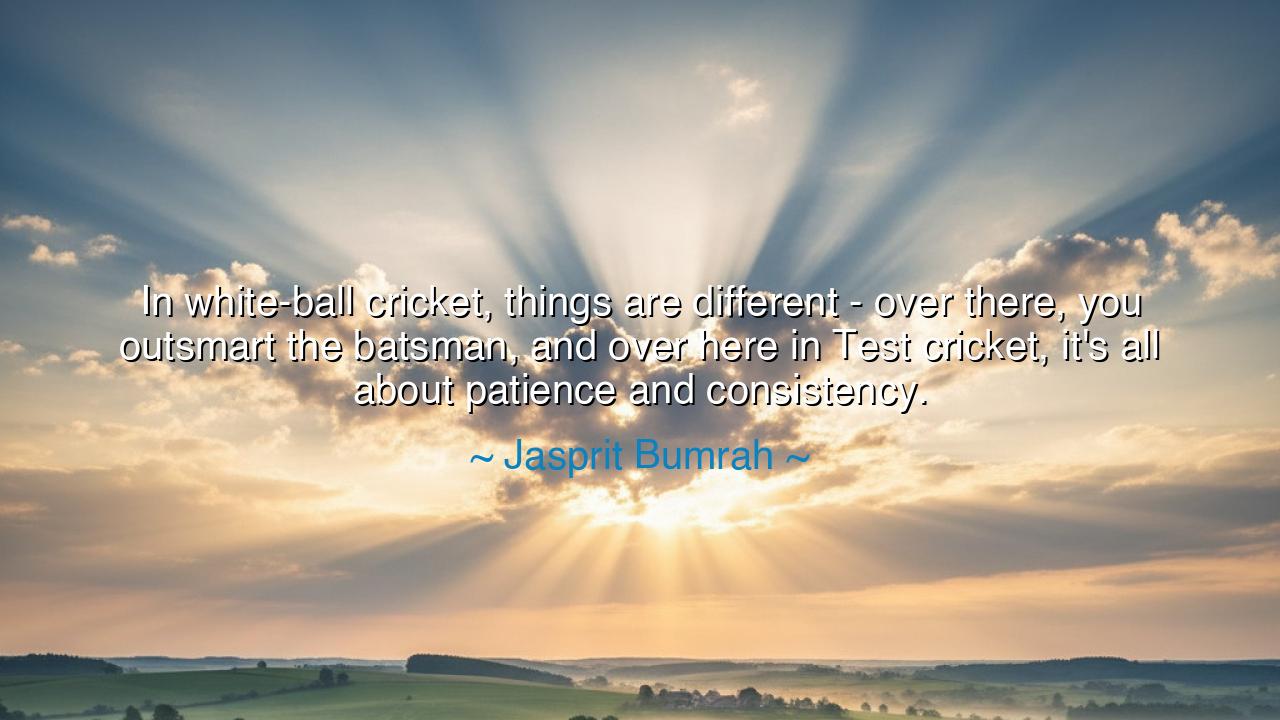
In white-ball cricket, things are different - over there, you
In white-ball cricket, things are different - over there, you outsmart the batsman, and over here in Test cricket, it's all about patience and consistency.






Hear the words of Jasprit Bumrah, who declared: “In white-ball cricket, things are different – over there, you outsmart the batsman, and over here in Test cricket, it’s all about patience and consistency.” This utterance, though spoken of sport, carries within it the wisdom of life itself. For the games of men are mirrors of existence, and the lessons of the pitch are the lessons of the world: that sometimes victory comes through sudden cunning, and at other times through steadfast endurance.
In white-ball cricket, the struggle is swift, the margins narrow, and the bowler must deceive and strike before time runs out. It is the art of the fox—clever, agile, and quick of mind. To outsmart the opponent is the essence of survival, for the game is short, and fortune favors those who seize the moment. Yet in Test cricket, the ancient form of the game, time stretches like a great river. Here, brilliance alone does not suffice; it is the tireless discipline of patience and the unwavering rhythm of consistency that bring triumph. This is the art of the oak—rooted, enduring, unmoved by passing storms.
History, too, offers such parallels. Consider the campaigns of Alexander the Great, who in youthful swiftness conquered empires through bold maneuvers and daring strikes. His was the spirit of white-ball cricket—to dazzle, to surprise, to strike swiftly before resistance could gather. Yet contrast him with the Romans, who built their empire stone by stone, road by road, never in haste, but always with consistency and patience. Theirs was the spirit of Test cricket, enduring for centuries, not by brilliance alone but by the discipline of steady labor.
The same truth holds in life’s battles. In moments of urgency—whether in crisis, decision, or opportunity—one must think as in the white-ball game: adapt, act quickly, and outsmart the challenge. But in the great journeys—the building of character, the pursuit of knowledge, the nurturing of relationships—it is the lesson of Test cricket that prevails: remain steadfast, cultivate patience, and hold to consistency even when the results seem slow in coming.
Bumrah’s words remind us that wisdom lies not in choosing one way alone, but in discerning which way the moment requires. The fool tries to play every battle as a sprint, exhausting himself in haste. The coward hides behind endless waiting, never daring to strike. But the wise know when to move like lightning and when to endure like stone. Both paths are noble, but each has its time, and greatness belongs to those who master both.
One can recall Rahul Dravid, the “Wall” of Indian cricket, whose greatness in Tests was born of patience unmatched, defending hour after hour until the will of opponents broke. Yet in the shorter formats, legends like M.S. Dhoni showed the fox’s craft—reading the bowler, waiting for the moment, and then outwitting them in a single stroke to finish the game. Between these two spirits lies the fullness of life: the calm of endurance and the fire of cunning.
So the lesson for all who hear is this: in your own life, learn to be both fox and oak. In urgent matters, sharpen your mind, act swiftly, and outsmart the obstacle. In long labors, hold fast, cultivate patience, and let consistency be your companion. Do not confuse the one for the other; do not rush when you must endure, nor wait when you must strike.
Thus let Bumrah’s wisdom echo beyond the boundary: the game of cricket is but a mirror of existence. For some battles demand brilliance, and others demand endurance. Know which is which, and you shall find victory not only on the field, but in the grand contest of life itself.






AAdministratorAdministrator
Welcome, honored guests. Please leave a comment, we will respond soon